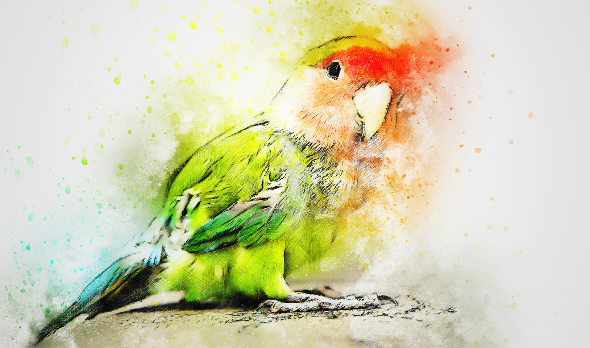
What to do when your bird dies suddenly?
The death of a companion bird can be overwhelming. Caretakers are often so grief-stricken that it’s hard for them to function, but this is the time when a very important decision needs to be made:
Whether or not to have a necropsy performed?
While difficult to imagine, it’s important to set aside feelings of grief for a moment to reflect on the circumstances leading up to the loss of the pet. If the bird was looking sick for a few days prior, or the death was sudden or unexpected, it is often very helpful to get a necropsy done to determine the exact cause of death. This can be valuable for many reasons: to determine human error, malnutrition, or unknown diseases (that could affect other flock members, pets, or even humans [psittacosis]). Lastly, having a necropsy performed can often bring unexpected peace of mind. Without knowing the exact cause of the bird’s death, many owners torment themselves worrying that they did something wrong in caring for or treating the bird.
The sooner a necropsy can be performed, the better
Once the decision is made to go ahead, it is essential that a qualified Avian Veterinarian complete the gross necropsy (with histopathology). Autolysis (tissue breakdown) begins as soon as death occurs, and this can significantly impact the results of a necropsy.
Prepare for the necropsy
The first thing to do is cool down and store the bird’s body – as best and as soon as possible. Place the bird in a ziplock bag (larger birds will need to go into a larger bag with the end tied off tightly) and place in a refrigerator. Do not freeze. This will cause damage to some tissue that might be needed for accurate testing. A call should be made to the Avian Vet to discuss the best way to bring in/ship the bird to them.
Provide the vet with the bird’s history (the vet can send their records to the pathologist) as well as information about the age and species of the bird, the diet it was fed and anything relevant to its death, such as recent seizures or inability to stay balanced, regurgitation, etc. This history will help give clues as to what a pathologist is looking for. Also advise the vet if there are other birds at home, and where they are housed, and/or if the bird had recent contact with any birds outside of the home.
Questions to ask your avian veterinarian prior to necropsy
- What is the cost of a necropsy (with histopathology) and do I need both?
- Can I request a “rush” necropsy?
- What does the necropsy lab do?
- What information should I expect to find in the necropsy report?
- Who will perform the necropsy?
- What toxins do you test for?
- What happens to my bird’s body after the necropsy? What are the cremation/disposal options?
- Do you accept a body for necropsy after hours?
- How should my bird’s body be stored until I can deliver his body for necropsy?
- How long can I store my bird’s body until I can deliver his body for necropsy?
- How long will I wait for the necropsy results?
- Along with the body and health history (health booklet), do you need any environmental samples (i.e.. water from dish, food from dish, stool sample, etc.)?
Necropsy is a difficult subject for many companion parrot caretakers. And sadly, they often need to be considered at a very difficult time. Thinking about the process involved in advance can make it easier to arrive at an informed decision when the time comes.



